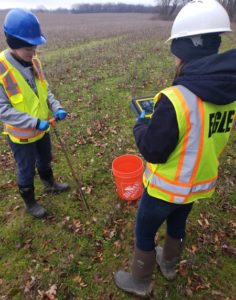
Concerning levels of PFOS, a toxic PFAS compound, have been found in beef raised on a farm near the edge of the Huron River watershed in Livingston County. The farm has sold beef locally for many years, mostly in the Brighton, Howell, and Hartland communities. The beef produced at the farm was not sold to grocery stores. The Michigan Department of Health and Human Services and the Michigan Department of Agriculture and Rural Development have issued a joint consumption advisory. State agencies are helping the farm notify customers.
HRWC does not believe there are risks to water quality or drinking water from this contamination, though it’s possible that runoff from the farm fields is contributing to low but widespread levels of PFAS in the watershed. The state investigation of nearby wells has not found PFAS at significantly elevated levels.
The source of the PFOS contamination was biosolids applied to farm fields as fertilizer from 2010 through 2015. The biosolids came from the Wixom Wastewater Treatment Plant, and the PFOS in those biosolids came from Tribar Manufacturing, the same major source that was discovered in the Huron River watershed in 2018. Since then, Tribar has been filtering PFOS from its discharge and the Wixom Wastewater Treatment Plant no longer sells its biosolids to farmers.
PFOS was also found at high levels in soils and in crops produced on the farm to feed the cattle. This setup of producing the feed and beef on the same farm is not common in Michigan, and is one of the reasons that the contamination was higher here than elsewhere where biosolids have been applied to farm fields. State officials do not believe the levels of PFAS found in beef at this farm are representative of PFAS found in beef produced in Michigan.
The average PFOS level found in beef samples was 1.9 parts per billion. There are no federal or state standards for regulating PFAS in beef, but the Michigan PFAS Action Response Team and state agencies have issued a public health advisory so that consumers can make their own choice. In determining risk, the USDA and EPA use obsolete guidance data that may not be sufficiently protective of human health. The state of Michigan evaluated the risks of beef consumption with an updated understanding of the risks of PFAS in food.
MPART notified members of the Citizens Advisory Workgroup of the state’s findings on Friday, January 28th. HRWC is represented in that group.
The state does not believe that the relatively small farm in question is at fault, and based on the information at hand, we agree. The farm has been highly cooperative with state officials, and they were using an established, sustainable practice of using biosolids as fertilizer without knowing that PFAS in the biosolids when they were applied. Discovery of the PFAS levels in beef and an assessment of their risk is life-altering for this small farm, and it will be a concern for those that have eaten beef produced here over several years.
The blame, however, ultimately falls on the manufacture and use of PFAS for chrome plating. PFAS do not break down in the environment. This case is another frustrating reminder of how persistent PFAS are and how widespread their effects can be once they are created. They are effectively permanent, and are usually used for non-essential, cosmetic or convenient purposes. These entire class of these toxic PFAS chemicals should be restricted from use in all non-essential applications. That’s the only way we will break the long-term PFAS cycle, protect people, and the environment.
To read the MPART Area of Interest description, click here.



